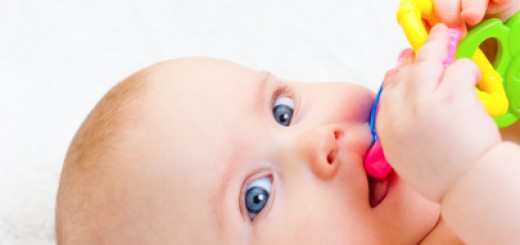Baby Teeth Basics

As if your baby couldn’t get any more adorable … they took the cute factor up a notch with the addition of some tiny teeth. We asked Dr. Katherine Finkel of Fairfield Dental Associates for her tips on cleaning, dental visits, and how to develop good oral hygiene habits early. (And in case you missed it, check out our blog post on teething remedies!) Q: When should I start brushing my child’s teeth? A: Teeth should be cleaned as soon as they erupt to avoid dental carries (tooth decay), the number one bacterial infection in children. Parents should brush their child’s teeth until they can brush them on their own, typically by age 8. Primary teeth are just as important as permanent teeth, and require professional care and consistent daily hygiene. These “baby teeth” maintain space on the dental arch, and provide a proper path for the eruption of permanent teeth. They influence normal development of the face, and are critical as your child learns to eat and speak. During each hygiene visit, your dentist will evaluate your child’s arch development, dental alignment, and teeth eruption.
Q: When are the best times to brush, and what do I need? The best times to brush are after breakfast and before bedtime. Use a toothbrush with soft, round-ended bristles. Using an ADA accepted toothpaste, apply a small, pea-sized amount, and be sure your child spits out the excess amount vs. ingesting it. After brushing, parents should floss children’s teeth to remove plaque between teeth where toothbrushes cannot reach. Q: What should parents know about how to best take care of our baby’s teeth? Teeth are made primarily of minerals, and continuously cycle between de-mineralization and re-mineralization. Bacteria from foods and fluids left on the teeth after eating create acid, which de-mineralizes (weakens) the tooth enamel. With proper time between meals, the enamel is re-mineralized by saliva, reversing the damage caused by the acid. If your child consumes significant amounts of juice and snacks, the abundance of bacteria doesn’t allow the teeth to re-mineralize, and decay develops. Known as dental caries, left untreated, it can lead to infection, tooth loss, significant pain, and serious systemic infection. Q: What does fluoride do? Fluoride helps create stronger tooth enamel, so it’s important that your child doesn’t get too much or too little. Other than toothpaste, the most prevalent source of fluoride is in drinking water. I encourage parents to discuss their child’s fluoride sources with their dentist to make sure they are getting the proper amount. Q: When should I schedule my child’s first dental visit? How often should they go? It’s recommended that your child first sees a dentist six months after the first tooth comes in, or at the latest by their first birthday. The first consultation with your dentist is an important milestone in your child’s oral health, during which you’ll gain answers to many questions regarding your child’s future care. A typical dental exam includes checking of teeth for cavities and proper dental development, teeth cleaning, application of fluoride, and patient education regarding diet, oral hygiene, and proper home care. Q: What else can I do to make sure my child has healthy teeth and gums? A healthy diet is good for your child’s body, and good for his mouth as well. Avoid foods that create an acid environment, or stick to the teeth, including soda and sugary drinks that cause decay, and candy, and pretzels/chips that stick to the biting surfaces. Build strong teeth and bones with foods rich in Vitamin D and calcium. Allow “downtime” between meals so the teeth can re-mineralize and recover from any damage, resulting in strong, healthy, caries-free teeth.
Create your teething weeList and share with your friends!
Dr. Katherine Finkel is a 1992 graduate of Columbia University School of Dental and Oral Surgery. Dr. Finkel’s unique approach combines the artistry of cosmetic dentistry with her medical training in holistic dentistry – the strong connection between the mouth and the body, and its relationship to overall health. Dr. Finkel is a member of the American Dental Association and the Academy of General Dentistry.



